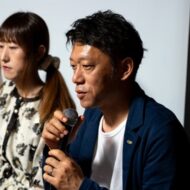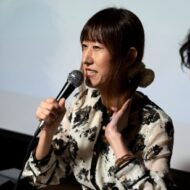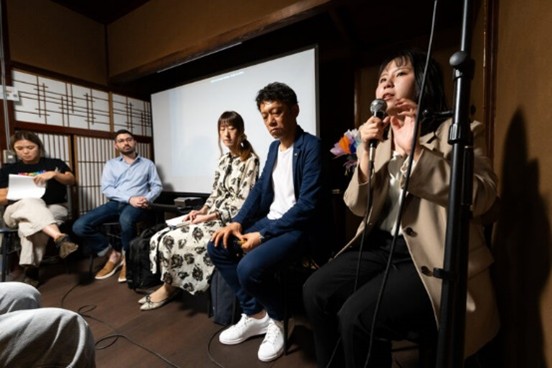Despite the increasing awareness of the term “LGBTQ+” in society, few listed companies have taken concrete steps to address the issue. To explore ways to create a more inclusive work environment, we invited four experts, business professionals, and industry insiders to share their insights and experiences.
Ms. Tsukina Ito delivered a presentation on “LGBTQ+ Training for Companies”
Ms. Ito’s company, JobRainbow, operates a job matching site that connects diverse companies with people who want to work in diverse work environments, aiming to create a more inclusive workplace. In addition to providing job listings, the company also offers training and consulting services to businesses. Ms. Ito works as a consultant specializing in Diversity & Inclusion (D&I).
She explained that diversity refers to the state of having diverse people, and inclusion is about recognizing diverse human resources, accepting and embracing differences, and creating a foundation for them to flourish.
LGBTQ+ people are said to make up 8.9% of the total population, or 1 in 11, which is more than the number of people with the six most famous Japanese surnames (Sato, Suzuki, Takahashi, Tanaka, Ito, and Watanabe) combined. The reason why we have so many opportunities to meet people with these surnames but so few opportunities to meet LGBTQ+ people is because, according to the data, while 42% of the parties want to come out at work, only 5.8% have actually come out to their colleagues and 3.5% to their bosses, making their existence socially very difficult to see, she says.
In a survey of those involved, 55.7% said they frequently see or hear discriminatory remarks in the workplace, and it is not easy to come out if the environment is not conducive to coming out or if they think they might be subjected to discriminatory remarks.
There are four components to gender identity: (1) sex assigned at birth, (2) gender identity, (3) gender expression, and (4) sexual orientation, and each person is completely different because gender identity is considered to be a combination of these factors.
Ito emphasizes, “The best thing we can do is to create a society that respects and values diversity, acknowledging that everyone is different, regardless of gender identity. It’s not enough to say, ‘I’m not LGBTQ+, so it doesn’t matter.’
Why should companies prioritize LGBTQ+ inclusivity?
The data is clear: in non-LGBTQ-friendly workplaces, the turnover rate of LGBTQ+ employees is 13 times higher, and productivity is 40% lower. Companies lose a significant amount of money due to reduced focus and increased turnover. It’s not solely up to individuals or organizations to address this issue; society as a whole needs to evolve.
The needs of society are shifting, with 89% of people wanting to work for an LGBT-friendly company, and 69% of non-participants expressing interest in working for one. Moreover, the Power Harassment Prevention Act now requires companies to take responsibility for preventing Sexual Orientation and Gender Identity (SOGI) Discrimination & Harassment and creating a safe work environment.
Ms. Ito believes that the first step individuals can take is to examine whether their statements are based on prejudice.
“While it’s impossible to eliminate unconscious bias entirely, simply correcting our language can help create an environment where everyone feels comfortable and included.”
Presentation by Shingo Hayase, a D&I HR professional in Ishikawa Prefecture
Mr. Hayase belongs to Nouka Real Estate Corporation, a real estate company with 5 branches located throughout the prefecture.

Keigo Hayase, who is in charge of recruitment and human resource development at Nouka Real Estate Co.
In July 2021, Kanazawa City launched its “Partnership System,” followed by a declaration of LGBT-friendliness. The city aimed to achieve four key objectives: “cultivate appropriate knowledge,” “challenge norms,” “make understanding and support visible,” and “prohibit discrimination.
When asked about the Friendly initiative, an internal questionnaire survey showed that 92% of respondents rated it as “very good” or “rather good.” This encouraging response boosted staff morale and confidence in continuing the initiative.
They have made two restrooms in all stores, one for women only and the other for all genders, made sure that those who apply to the company are subject to the same rules as those who have registered their marriage within the company, and reviewed the work rules that prohibit discrimination.
How can we create an inclusive workplace from Kanazawa?
Two people involved in the project joined us for a talk session.
Ms. Minori Tokieda, a representative from NPO Pride House Tokyo, shared her experiences as a transgender person in the workplace.

Minori Tokieda has been dedicated to promoting the proliferation of partnership systems and realizing same-sex marriage through her various activities.
Ms. Tokieda emphasized that transitioning is a gradual process that affects not only one’s gender identity but also their mental and social aspects. She highlighted the importance of understanding and support from colleagues during this transition period, as it can significantly impact a person’s ability to work effectively.
She shared that in various situations, her gender identity was disclosed without her consent, causing her to worry about how well her employer would protect her privacy. This concern made it challenging for her to feel comfortable at work.
Guilherme Castro, a Brazilian national who lived in Kanazawa until four years ago, has been in Japan for eight years. He has been a university student at Kanazawa University since 2016 and worked part-time at a travel agency.
Guilherme shared his insights, saying, “People often think that coming out is a one-time event, but in r
eality, it’s an ongoing process. You’re constantly facing situations where you need to come out, and this is a continuous aspect of your life.”
He mentioned that in Brazil, there are laws that safeguard the rights of the LGBTQ+ community, allowing individuals to openly declare their sexual orientation in the workplace. “In Japan, I am currently employed at my third company. I was able to do so at my first company and my current company, which is a foreign-owned firm. However, at my second Japanese company, there was no policy or guidelines in place for LGBTQ+ issues, leaving me uncertain whether my sexual identity would be respected. As a result, I was unable to confidently declare my gender identity”.
When I asked Ms. Ito about the challenges faced in non-inclusive workplaces and the consequences of delayed legal progress, she highlighted the issue of employees leaving companies in Kanazawa and Akita, for example, due to the lack of a safe and welcoming work environment. She emphasized that if companies fail to address these issues or remain silent, they inadvertently create an atmosphere where employees feel uncomfortable or reluctant to come out.
While companies can play a role in driving social change, there are certain limitations to their abilities, and some issues require legislative solutions.
Ms. Tokieda said that “in Japan, same-sex marriage is currently not legally recognized, and there is no anti-discrimination law to protect LGBTQ+ individuals. This year’s LGBT Understanding Promotion Act is often referred to as a “philosophy law” because it lacks enforcement mechanisms, with no penalties for non-compliance”. She emphasized that the crucial question is how far companies can go in creating a workplace where employees feel comfortable being open about their sexual orientation.
One of the most common questions we received in advance was, “How do I get started with creating an inclusive workplace?”
According to Ms. Ito, there are two patterns when it comes to creating an inclusive workplace: one where someone has already come out and needs support, and another where someone is unsure whether they should come out or not. In the former case, we would ask the individual what they would like us to do, and then gradually clarify what we can and cannot do, clearing up each point as we go. In the latter case, the first step is to check what areas are not inclusive.
Ms. Tomita, Coordinator of the UNU-OUIK, stated, “If we just discuss today’s session at your company next week, that will be one step forward,” and with that, the session has come to a close.






